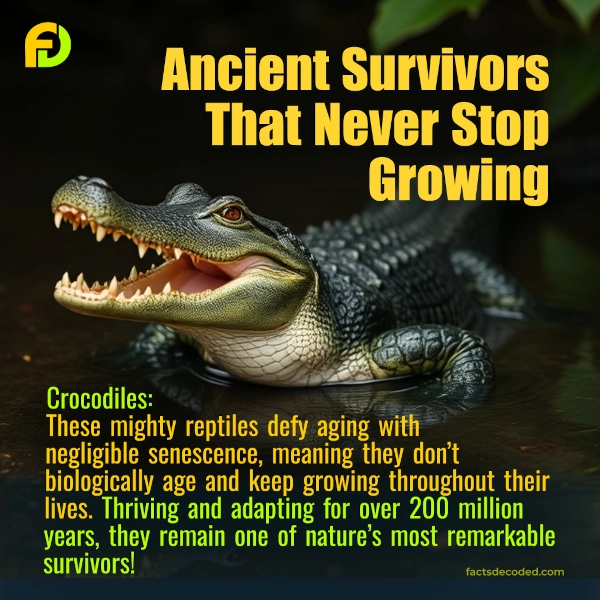
Ancient Survivors That Never Stop Growing
Crocodiles have walked the Earth for over 200 million years, a testament to their adaptability and resilience. These awe-inspiring reptiles are among nature’s most fascinating creatures, not just for their ancient lineage but also for their unique biological traits, including a phenomenon called negligible senescence. This means crocodiles don’t experience biological aging like most other animals, allowing them to thrive and grow throughout their lives.
The Science Behind Indeterminate Growth
Unlike mammals and birds, crocodiles exhibit what scientists call indeterminate growth. This means that while their growth rate slows over time, it never completely stops. Crocodiles continue to grow larger as long as they have access to sufficient food and favorable environmental conditions. This ability is closely tied to their negligible senescence, a rare trait that allows them to maintain their vitality without succumbing to the physical decline typically associated with aging.
Why Crocodiles Don’t Die of Old Age
Crocodiles’ biology is so robust that they don’t die from aging itself. Instead, their deaths are usually caused by external factors such as:
- Targeted by predators during early life stages
- Starvation or injuries
- Habitat loss due to environmental changes
This makes them one of the longest-living reptiles in the wild, with some individuals reaching 70-100 years or more under optimal conditions.
Fascinating Facts About Crocodiles:
- Crocodiles have been around since the time of the dinosaurs and survived the mass extinction that wiped out most other species.
- The largest crocodile ever recorded measured over 23 feet and weighed about 2,370 pounds.
- Despite their fearsome reputation, crocodiles play a crucial role in maintaining the balance of aquatic ecosystems.
Isn’t it amazing how crocodiles keep growing and thriving for millions of years? What do you think about their incredible adaptability? Share your thoughts in the comments or dive into our “Animal Adaptations” section to uncover more about how creatures conquer the challenges of survival in the wild!

We choose not to clutter your experience with ads. If you’d like to support us, consider showing some love by liking this post on X (Twitter), Instagram or Facebook!
Share this Post, Spread the Knowledge!
